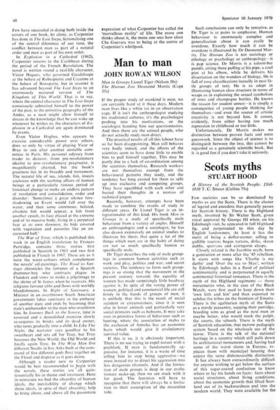Man to man
JOHN ROWAN WILSON
Men in Groups Lionel Tiger (Nelson 50s) The Human Zoo Desmond Morris (Cape 35s) If the proper study of mankind is man, we are certainly hard at it these days. Modern man lives like a white rat in an observation cage. If it isn't the anthropologist studying his traditional cultures, it's the psychologist probing into his motivations, or the sociologist handing him out questionnaires. And then there are the animal people, who do not actually study man direct.
The practical results of all this labour have so far been disappointing. Man still behaves very badly indeed, and the efforts of the scientists seem to have done little to enable him to pull himself together. This may be partly due to a lack of co-ordination among the scientists themselves. Research workers are not themselves exempt from the behavioural patterns they study, and the tendency has long existed for them to split up into exclusive and competing groups. They have squabbled with each other and buried their thoughts in a morass of technical jargon.
Recently, however, attempts have been made to combine the results of study in different areas. Dr Lionel Tiger is an in- tegrationalist of this kind. His book Men in Groups is a study of specifically male behaviour from a variety of angles. Himself an anthropologist and a sociologist, he has also drawn extensively on animal studies to illustrate his thesis that quite a lot of the things which men are in the habit of doing are not so much specifically human as specifically male.
Dr Tiger describes the role of male group- ings in common human activities such as work and play, politics and war, and secret societies. The tendency to form such group- ings is so strong that the movement in the present century towards the equality of women has made surprisingly little headway against it. In spite of the voting power of women, political and commercial life are still firmly in the hands of groups of men; it is unlikely that this is the result of social accident or circumstances, since it is seen also in lower animals and particularly very social primates such as baboons. It may take root in primitive forms of behaviour such as hunting, where the association of males to the exclusion of females has an economic basis which would give it evolutionary survival value.
If this is so, it is obviously important. There is no use trying to expel nature with a pitchfork. If man is fundamentally ag- gressive, for instance, it is a waste of time telling him to stop being aggressive—we must instead try to direct his aggression into less dangerous channels. And if the forma- tion of male groups is deep in our evolu- tionary make-up, then we are stuck with it for good. The feminists will have to recognise that there will always be a limita- tion to their assumption of the masculine role.
Such conclusions can only be tentative, as Dr Tiger is at pains to emphasise. Human behaviour is enormously complex and generalisation about it can easily be overdone. Exactly how much it can be overdone is illustrated by Dr Desmond Mor- ris. The Human Zoo is not sociology or ethology or psychology or anthropology—it is pop science. Dr Morris is a saloon-bar pundit, sitting there puffing at his pipe, a cool pint at his elbow, while he delivers his dissertation on the wonders of biology. He is full of cosy classifications (usually in neat lit- tle groups of ten). He is as adept in illustrating human class structure in terms of wasps as in explaining the sexual symbolism of trees and champagne bottles. He knows the reason for student unrest—it is simply a consequence of young people thinking for themselves—and even the source of artistic creativity is not beyond him. It comes, evidently, from either having too much repression in childhood or too little.
Unfortunately, Dr Morris makes no distinction between proven facts and mere guesswork. Since the object of science is to distinguish between the two, this cannot be regarded as a genuinely scientific book. But it is good fun if you don't take it seriously.


































 Previous page
Previous page